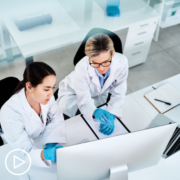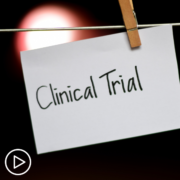A CLL Expert Addresses Common Clinical Trial Misconceptions
A CLL Expert Addresses Common Clinical Trial Misconceptions from Patient Empowerment Network on Vimeo.
CLL patients and care partners often have misconceptions about clinical trials. CLL expert Dr. Adam Kittai addresses common patient questions and concerns about trials.
Dr. Adam Kittai is a hematologist and an assistant professor at the The Ohio State University Comprehensive Cancer Center – The James. Learn more about Dr. Kittai, here.
See More from CLL Clinical Trials 201
Related Resources:

|

|

|
Transcript:
Katherine:
Right. So, I’d like to walk through a few common questions that patients have about clinical trials. And here’s a concern we received from a patient prior to the webinar. “I’m nervous that I will receive a placebo if I join a clinical trial.” So, first of all, would you define a placebo?
Dr. Kittai:
Sure. A placebo is usually a sugar pill or something that has no effect. That’s what a placebo is.
Katherine:
And is it true then, would a patient possibly get a placebo in a CLL clinical trial?
Dr. Kittai:
Not typically. So, in terms of clinical trials for CLL, we have a lot of treatments that are effective and safe in CLL. And so, we don’t typically design trials where you’re not getting some kind of active therapy. It would be extremely rare, and I don’t know of any trials currently that involve patients getting a placebo for CLL. Because it wouldn’t be ethical for us to enroll a patient on a trial where they would get a placebo instead of active therapy.
Katherine:
Here’s another question from an audience member, and I think this is probably a common concern for patients. “Is a clinical trial only something I should consider if there are no other options?”
Dr. Kittai:
So, in my opinion, you should always consider a clinical trial, even if there are other options. And it’s because of those two reasons that I mentioned earlier. Number one, it benefits the CLL community as a whole to participate in the trial so that way doctors and researchers can collect data to improve outcomes for patients with CLL. And also, even though our drugs currently work really well, we don’t know how well they’ll last for, right? So, they still don’t know for certain how long our current drugs are going to work for in the future.
And we’re always trying to do better. We’re always trying to create some sort of treatment, some sort of treatment paradigm that might be safer, as well as work better, and either of those goals is approvable. All of our drugs come with toxicity, right? And even though they’re really safe and they work really well, we’re hoping to develop something that is even safer and works even better.
Katherine:
Yeah. It sounds, then, like trials can be considered throughout a patient’s life with CLL. What concerns do you hear from your patients?
Dr. Kittai:
Yeah, so I think the primary concern I hear about a trial and the difference between going on a trial and standard of care, is that typically for a trial, it does require a little bit more from the patient. Meaning that there’s usually more visits – whether it is to monitor the effect of the new medication or new medication combination on the patient, whether or not it’s affecting their laboratory values or how they’re feeling.
Or there might be parts of the trial that require invasive procedures. So, for instance, many trials will require bone marrow biopsies where a standard of care won’t. And the reason why the collection of those bone marrow biopsies is important for the trial is to better get an idea of how the treatment is working on a patient’s body.
So, I think those are the two primary concerns I hear from the patient. Number one, it typically is a bigger time commitment with more visits to the doctor because we have to closely monitor the patients while they’re on trial. And number two is sometimes the trial involves procedures that otherwise wouldn’t be indicated for standard of care.






